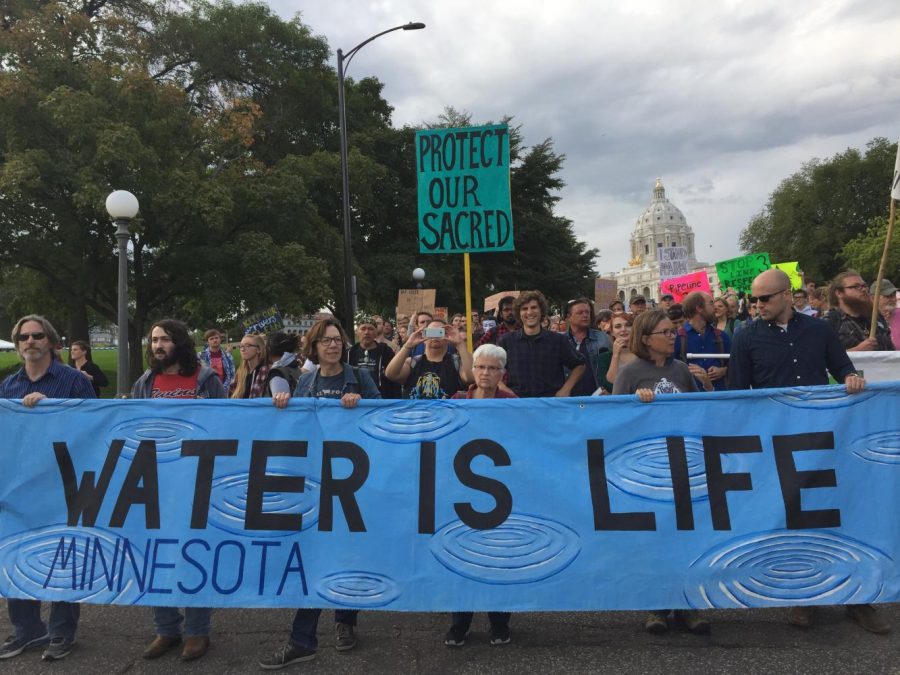Line 3 prompts debate
Public opinion divided on new pipeline
Used with permission from Ryan Lee
Protesters march on the Capitol in downtown St. Paul to demonstrate against Line 3 on Sept. 28.
October 25, 2017
Senior Ryan Lee said he recently attended ‘Hold the Line: March to the Capitol and Public Hearing to Stop Line 3,’ a protest Sept. 28 in downtown St. Paul to demonstrate against the proposed pipeline.
“(The march) was really cool. There were a lot of different people there, people who love nature all across the board, whether they were indigenous or white, everyone banded together for a common cause,” Lee said. “It was really nice to see.”
According to Enbridge Communications Supervisor Shannon Gustafson, Line 3 would replace an older line to provide energy to the Midwest.
“Line 3 is a maintenance replacement project intended to replace an existing pipeline, which provides crude oil to Minnesota and neighboring states’ refineries, to provide resources we all use in our daily lives,” Gustafson said. “The existing Line 3 has been in service since the 1960s. We are looking to replace the line and restore the original capacity of the line with Line 3.”
Lee said he opposes the pipeline because of its potential impact on the surrounding Native American population.
“I’m against Pipeline 3 because it would uproot families, especially indigenous people from their homeland and violate Native American treaties,” Lee said. “I went to the protest to stand up against it.”
Gustafson said the new Line 3 will employ modern technology with emphasis on new safety measures.
“We are looking to replace the existing Line 3 with a new state-of-the-art pipeline, and we will be using new technology, new construction techniques, thicker steel, a few examples of the newer technologies that are available to us today, as well as coatings that weren’t in use at the time the original Line was put into place designed to keep the pipeline safer,” Gustafson said.
Sophomore Ellen Poulter is against the pipeline because Line 3’s location could impact her personally.
“I go to summer camp up at Cass Lake on Star Island, Camp Unistar,” Poulter said. “Unistar is kind of a really special place to me, and Line 3 could potentially go through Cass Lake and cause damage to Star Island, and that would be rather unfortunate.”
Gustafson said public input is of great value to all Enbridge’s projects.
“We believe it is important to hear input from all perspectives on pipeline and energy infrastructure projects. Input we’ve heard from landowners, communities, tribal organizations, and elected officials have given us the opportunity to make up to 50 different route changes in the replacement project,” Gustafson said. “(Public input) happened both in community meetings, hearings, one-on-one group meetings and also in the regulatory process.”
Freshman Maya Lee said she opposes the pipeline because of the environmental impact.
“I don’t think (Line 3) should be put in, it would damage a lot of Minnesota and Canada, just the way our ecosystem is set up, up north (the environment) is really nice and I don’t think we should change it,” Lee said.
Gustafson said Enbridge has worked to provide citizens with multiple ways to voice the public’s opinions.
“Enbridge has been meeting with stakeholders for the Line 3 replacement project for a number of years in meetings, about 400 a year, and there has also been a number of regulatory proceedings,” Gustafson said. “There’s a number of public hearings going on right now. There is also a public comment period underway, so people can provide thoughts on the certificate of need or route permit in writing.”
Poulter echoed the possibility of potential damage to northern ecosystems and the environment.
“I’m against (Line 3) mostly because I feel it’s unnecessary to damage nature just for oil profit, and there are other ways to sustainably run things that aren’t through the use of oil,” Poulter said. “(Enbridge) says (Line 3) is just a replacement, but the route proves it’s a whole new pipeline.”
Lee said he believes economic benefits of the pipeline will not outweigh Line 3’s negative effects.
“The pipeline is unnecessary, there are a lot of people saying (Line 3) would create a lot of jobs, which it would, but there are also jobs it would undermine and people who would really be negatively impacted,” Lee said. “I don’t think the cost is worth the end product.”
Gustafson said oil is a crucial part of daily life and the public expects safety and dependability.
“The general public expects pipelines to be operated in a safe and reliable manner. Line 3 is part of Enbridge’s ongoing pipeline maintenance program to reduce the amount of future maintenance and landowner disruptions for maintaining safe operations,” Gustafson said. “Consumers as well as the nation’s economy depend on the safe and reliable delivery of energy. Pipelines deliver energy we use to fuel our vehicles, power manufacturing and grow jobs.”
Poulter said she would be eager to attend another demonstration or public event if given the opportunity.
“I would definitely consider attending a public hearing and if there are any other marches or protests come up, (if) they are important enough I would be willing schedule around them,” Poulter said.
Lee said he plans to attend speaking events open to the public to have his voice heard on Line 3.
“Since I went (to the march), there are supposed to be about 18 public hearings, and I am planning on attending a few just to check on the progress,” Lee said.
According to Gustafson and the Minnesota Public Utilities Commission, all public and evidentiary hearings are listed, and the public comment period closes Nov. 22 at 4:30 p.m. Comments can be submitted by email to publicadvisor.puc@state.mn.us or online at mn.gov/puc/line3/participate/comment.




